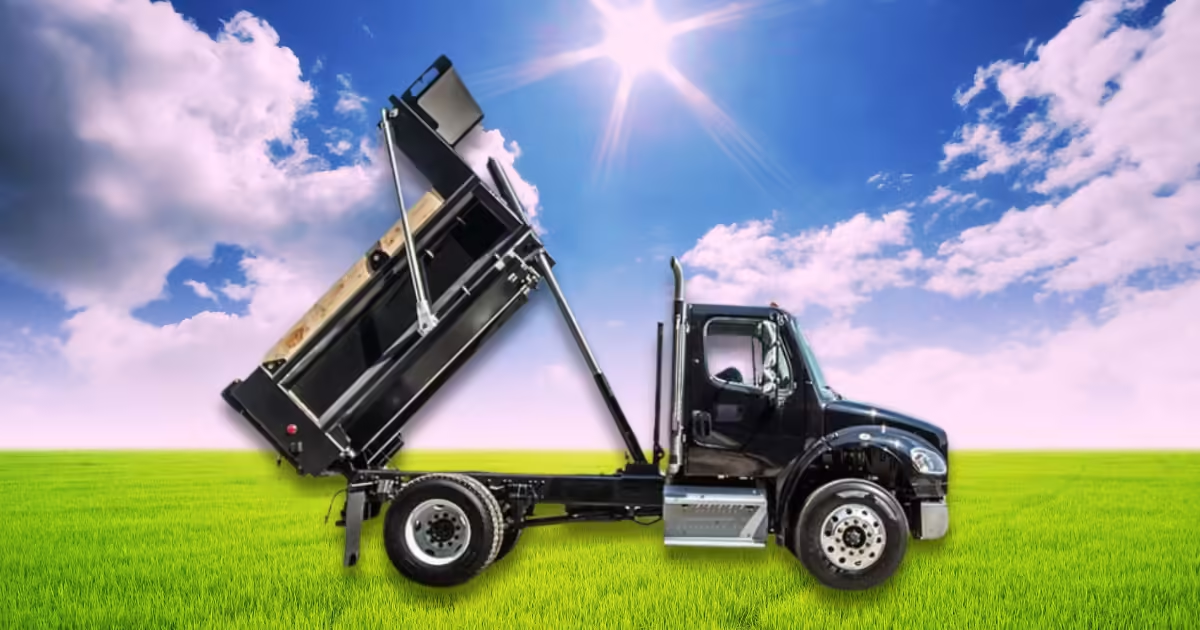The dumpster truck plays a vital role in modern waste management. These heavy-duty vehicles allow for the efficient collection and transportation of large volumes of waste, reducing the strain on manual labor and making waste disposal more organized and systematic. The importance of dumpster trucks spans across industries, including construction, residential, and commercial sectors. Here are five key reasons why they are essential:
- Efficient Waste Collection: Dumpster trucks streamline the waste collection process by efficiently handling large loads at once. This helps reduce the time spent on multiple trips for waste disposal.
- Variety of Uses: These trucks are versatile and can handle different types of waste materials, making them essential for both residential and commercial waste disposal.
- Cost-Effectiveness: Dumpster trucks reduce labor costs by simplifying waste collection. The ability to transport large containers means fewer trips, saving time and fuel.
- Improved Safety: They minimize the need for human interaction with waste, reducing the risk of injury or exposure to harmful materials, particularly in industrial settings.
- Eco-Friendly Operations: Dumpster trucks can help sort recyclable materials, contributing to sustainable waste management practices.
What is a Dumpster Truck? A Quick Overview of Its Functionality
A dumpster truck is a large, specialized vehicle used to transport waste in bulk from a collection site to a disposal facility, such as a landfill or recycling center. Unlike typical garbage trucks, these vehicles are designed to handle heavy loads from industrial, commercial, and large residential projects.
Equipped with hydraulic systems, dumpster trucks lift, transport, and dump large waste containers (also called dumpsters). These vehicles are often used in construction sites, demolition projects, and industrial facilities, where waste is generated in large quantities.
Dumpster Truck vs. Garbage Truck: What’s the Difference?
Although both types of trucks are involved in waste management, they serve different functions:
Dumpster Truck: Designed to handle large, heavy-duty dumpsters filled with construction debris or commercial waste. These vehicles typically transport large waste containers from industrial or commercial sites.
Garbage Truck: Used primarily for residential waste collection. They are designed to pick up smaller bins and bags of trash from homes and local businesses.
The key difference lies in the capacity and type of waste each vehicle handles. The first is meant for bulk waste and is commonly used for industrial and large-scale projects, while garbage trucks handle everyday trash collection.on.
How Dumpster Trucks Work: A Breakdown of Their Operation
A dumpster truck operates through a complex system of hydraulic arms and lifting mechanisms. Here’s a step-by-step breakdown of how it works:
- Pickup: The truck arrives at the site where the dumpster is located. Hydraulic arms on the truck attach to the dumpster’s sides.
- Lifting: Using hydraulics, the truck lifts the container, tipping it back to empty its contents into the truck’s main storage area.
- Transportation: Once the dumpster is emptied, the truck transports the waste to a disposal site, whether it’s a landfill or recycling center.
- Unloading: At the designated site, the truck lifts and tips the bed to unload waste efficiently.
This process is simple yet effective for handling large volumes of waste, particularly from construction or industrial sites.
Types of Dumpster Trucks: Which One Suits Your Needs?
There are several types of trucks, each tailored for different tasks and industries. The most common ones are:
- Roll-Off Trucks: These are popular in construction. They have a bed that rolls off, allowing the dumpster to be set down at a location for filling. Once full, the dumpster is rolled back onto the truck.
- Rear Loader Trucks: Used for smaller-scale waste collection, these vehicles feature a rear-loading mechanism. Waste containers are emptied into the back of the truck using hydraulic arms.
- Front Loader Trucks: Common in commercial waste collection, these vehicles lift dumpsters from the front, emptying the waste into a top compartment.
- Side Loader Trucks: Equipped with hydraulic arms on the side, these vehicles are ideal for residential areas and smaller commercial sites.
The type of truck you need depends on the scale and type of waste you plan to handle.
Rental Services: What to Consider
If you’re considering renting a dumpster truck, several factors should guide your decision:
- Type of Waste: Understand the kind of waste you’ll be collecting. For construction debris, you’ll need a more robust truck, such as a roll-off vehicle.
- Container Size: Trucks come in various sizes, so choose one that matches the volume of waste you need to manage.
- Cost: Rental prices vary based on the size of the truck and the rental period. Compare options before making a decision, ensuring you get the best value.
- Duration: Estimate how long you’ll need the truck. Some projects, like construction sites, may require the vehicle for extended periods.
- Local Regulations: Ensure that the rental service complies with local waste management regulations, especially if you’re dealing with hazardous materials.
The Importance of These Vehicles on Construction Sites
On construction sites, dumpster trucks are critical for managing debris like concrete, steel, and wood. Without a reliable truck, waste can quickly accumulate, slowing down projects and posing safety hazards.
Key benefits of these vehicles on construction sites include:
- Improved Efficiency: They reduce downtime by providing a quick and easy method for disposing of construction waste.
- Safety: Keeping construction sites free from waste materials reduces the risk of accidents and injuries.
- Cost Savings: These trucks cut costs by minimizing the need for frequent trips to disposal sites.
Safety Tips: Best Practices for Operators
Operating a dumpster truck involves risks, but by following these safety tips, you can minimize accidents and ensure smooth operation:
- Hydraulic System Maintenance: Regularly check hydraulic systems for leaks or malfunctions to avoid breakdowns during operation.
- Proper Loading: Ensure that waste is evenly distributed in the container to prevent the truck from becoming unbalanced.
- Use Protective Gear: Operators should wear safety gear, including gloves, helmets, and boots, to protect against potential hazards.
- Be Aware of Surroundings: Always check for pedestrians or other vehicles when operating the truck to avoid accidents.
- Routine Maintenance: Regular maintenance, such as checking brakes and hydraulics, is essential for ensuring the vehicle remains in good working condition.
Buying a Used Vehicle: What to Look For
Buying a used dumpster truck can save money, but it’s important to evaluate the vehicle carefully. Here’s what to look for:
- Condition of the Frame: Check for rust or damage to the truck’s frame. Structural integrity is crucial for safe operation.
- Hydraulic System: Ensure that the hydraulic system is functional and free from leaks.
- Tire Condition: Worn tires can cause accidents. Make sure the tires are in good condition with sufficient tread.
- Engine Performance: Test the engine to ensure it runs smoothly. A reliable engine is critical for long-term use.
- Maintenance Records: Ask for a detailed history of the truck’s maintenance to ensure it has been well-maintained over the years.
Maintaining a Truck: Key Tips to Extend Lifespan
Proper maintenance is essential for keeping a dumpster truck in good working condition. Here are some tips:
- Regular Oil Changes: Keep the engine running smoothly by changing the oil as recommended by the manufacturer.
- Hydraulic Checks: Regularly inspect the hydraulic system to ensure it’s working properly. Look for leaks and listen for unusual sounds.
- Brake Maintenance: Since these trucks carry heavy loads, ensure that the brakes are in excellent condition.
- Tire Care: Check tire pressure regularly and replace worn-out tires to ensure safe operation.
- Routine Cleaning: Clean the vehicle, especially after handling hazardous materials, to prevent corrosion and damage to the truck.
Discover more insights and valuable resources by visiting our homepage today!
Conclusion
Dumpster trucks are essential vehicles in the waste management industry. Their ability to handle large, heavy loads makes them ideal for industrial, commercial, and construction site waste disposal. From the various types of dumpster trucks, such as roll-off and front loaders, to their role in improving safety and efficiency, these vehicles are indispensable.
Whether you’re looking to rent, buy, or maintain a dumpster truck, understanding how they work and their value in waste management is crucial. Proper safety protocols and regular maintenance will ensure these vehicles serve their purpose effectively for years to come.understanding how they work and their value in waste management is crucial. Proper safety protocols and regular maintenance will ensure these trucks serve their purpose effectively for years to come.
FAQs About Dumpster Trucks
- What is the main difference between a dumpster truck and a garbage truck?
Dumpster trucks are designed for large-scale waste collection, often from commercial or industrial sites, while garbage trucks are used for residential waste. - How much does it cost to rent a dumpster truck?
The cost of renting a dumpster truck depends on factors such as the size of the truck, rental duration, and the type of waste being managed. Typical rental costs range from $500 to $1,500 per week. - What types of waste can a dumpster truck handle?
These trucks can handle various types of waste, including construction debris, industrial waste,4. What are the most common types of dumpster trucks?
The most common types of dumpster trucks include roll-off dumpster trucks, rear loader dumpster trucks, front loader dumpster trucks, and side loader dumpster trucks. Each type is suited for different waste collection needs. - How much weight can a dumpster truck carry?
The weight capacity of a dumpster truck depends on its size and type, but most of these trucks can carry between 10,000 and 30,000 pounds of waste. - Are dumpster trucks used for recycling?
Yes, many of these trucks are used for recycling, especially those designed to handle segregated waste like metal, glass, and plastics. - How often should I perform maintenance on a dumpster truck?
Routine maintenance, such as oil changes and brake checks, should be done regularly, typically every 3 to 6 months depending on usage. - Can I rent a dumpster truck for residential purposes?
Yes, you can rent smaller dumpster trucks for residential purposes, especially for tasks like large cleanouts, renovations, or landscaping projects. - What’s the lifespan of a dumpster truck?
With proper maintenance, a dumpster truck can last 10 to 15 years or longer. - What safety protocols should I follow when operating a dumpster truck?
Operators should always follow safety guidelines, including wearing protective gear, ensuring the hydraulic systems are functional, and regularly inspecting the truck for maintenance needs.
Emma Rose is a professional writer with over 3 years of experience covering a wide range of topics, including health, lifestyle, and technology. She is known for her in-depth research and commitment to providing accurate, trustworthy, and engaging content. Emma’s work focuses on delivering value to readers by simplifying complex topics and ensuring every article meets high editorial standards.




